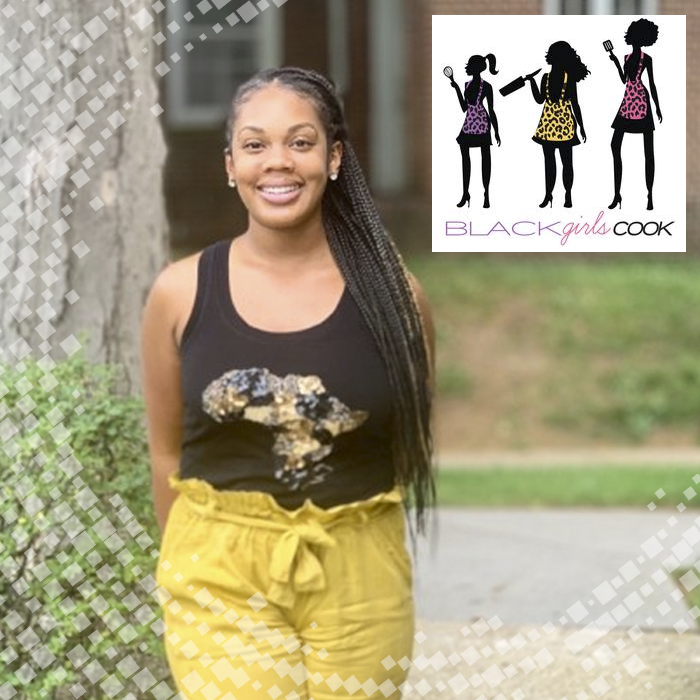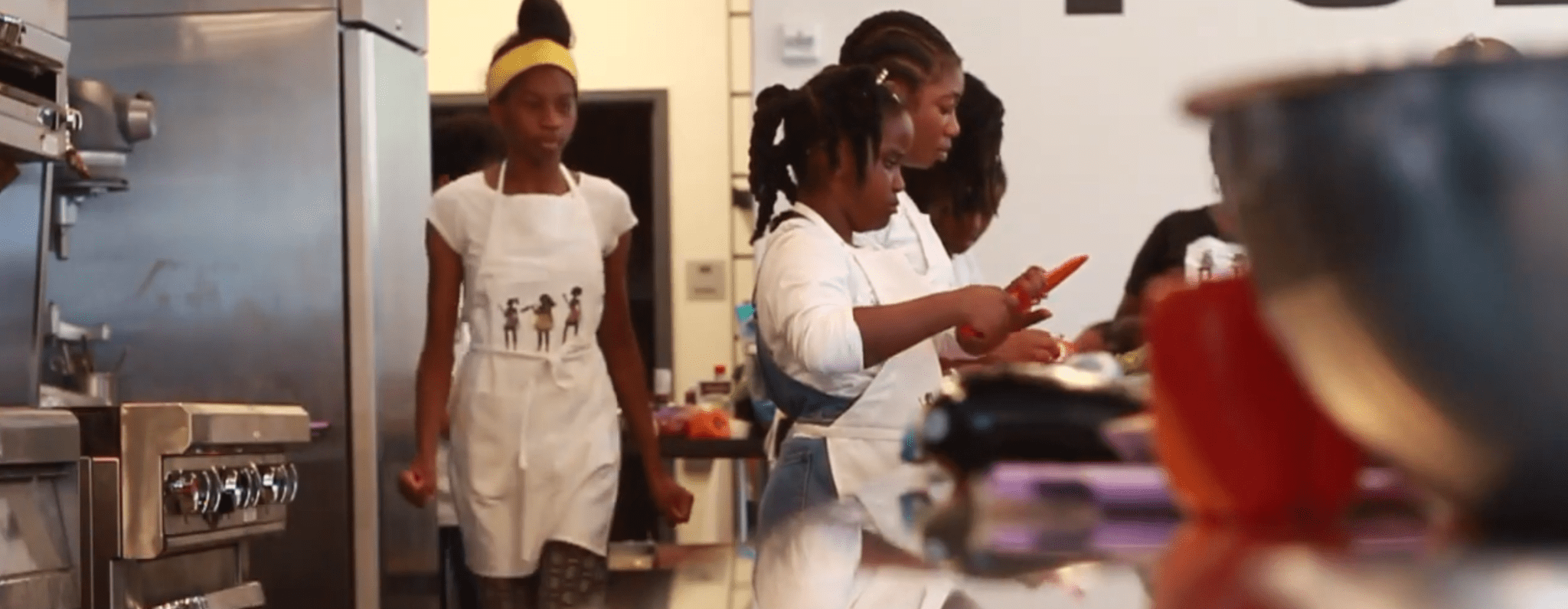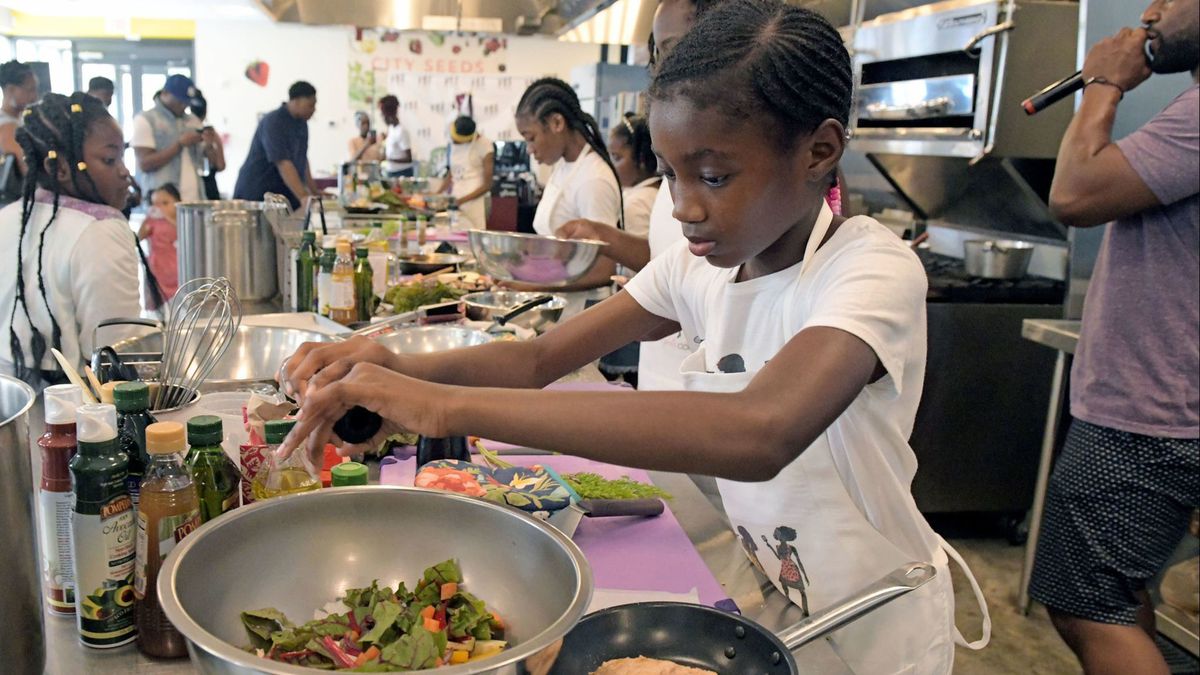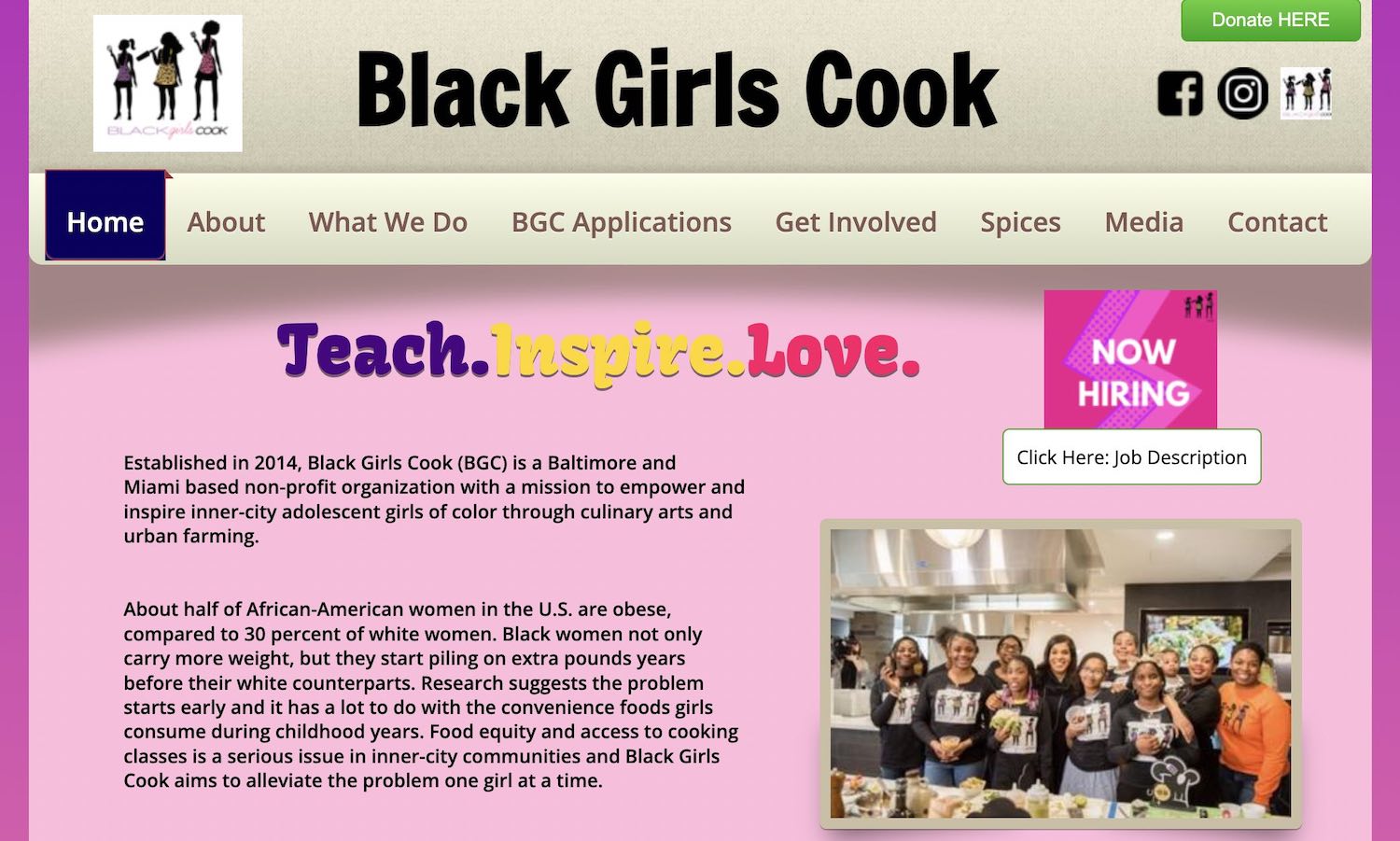Nichole Mooney established Black Girls Cook (BGC) in 2014 a Baltimore and Miami-based non-profit organization with a mission to empower and inspire inner-city adolescent girls of color through culinary arts and urban farming.
#blkcreatives sat down with Nichole the org based in Baltimore and Miami to talk with founder about her unpredictable journey to non-profit founder, culinary arts as a gateway to learning, and how using lessons from past experiences has helped her stay flexible in building a community around sisterhood and wellness.
Melissa Kimble, #blkcreatives Founder: So tell me what led you to start the organization and have this very important focus that you have?
Nichole Mooney, Black Girls Cook Founder: It’s kind of funny because I kind of like stumbled into starting Black Girls Cook. I worked in hospitality management. I’m not sure if you’re familiar with the movie Eat, Pray, Love with Julia Roberts. That inspired me so much because it was like this woman literally walked away from everything just to pursue her dream. So for me at this, at this point in time, I was working in hotels, really had no life because I worked all day.
In my spare time I would invited friends over and I would cook all of this stuff that I’ve been like wanting to make. Personally, I was going through a relationship that I felt wasn’t going anywhere. So I’m like, all right, I’m out of here. I’m leaving this job, ending this relationship and I’m moving to New York to pursue culinary. Then throughout that process, culinary school was super expensive. If anybody has gone to culinary school, they know that.
So instead of like giving up and moving back to Maryland, I worked with a bunch of chefs. I worked with a company where I was actually working alongside people who were spending all this money to go to Cordon Blue or these top culinary schools. In this process of trying to get more hands-on experience without going to culinary school, I end up working with a chef who, hired me to help assist with writing a cookbook and also hired me to work with alongside him as a sous chef for him as he was teaching a program in New York that was actually a part of a charter school.

He also had a nonprofit as well, where we’d feed the community – identifying certain boroughs in New York. One day he was home watching Black Girls Rock with his daughter and told me I should do something called like Black Girls Cook. And I was like, I like the sound of that.
I piloted the program when I was living in New York. The first program I piloted in the Bronx. Initially, I just wanted to get with the girls in the kitchen and cook but before we got into the kitchen, we’d talk about their lives – what made them happy, what made them sad, their issues and challenges. It really sparked a lot of interest in me. In the last almost nine years and doing a lot of research, my mindset and the mission has definitely evolved and the programs have definitely grown, but it really gave me more of a sense of the needs areas for this particular group of girls that’s our babies.
MK: That’s really special also, what a journey. I feel like some of the most innovative and aligned things come from when we’re just kind of using what we have, making adjustments at like every like pit stop. Like, oh, culinary school’s too expensive, let me do something else.
Nichole: The pandemic really forced people to learn how to pivot. And even with us, I’m like, what are we going to do with cooking? Okay, let’s figure it out. We gotta do it virtually to keep making an impact. So yeah, there are a lot of curve balls, but everybody can’t, some can’t thrive in the madness. I thrive in the madness, which is crazy. I think it goes back to my years in management because something always went wrong. Yeah. So it’s like, ok cool, we got this, we cool.
MK: Always good training. And that brings up another point of just how different experiences sometimes come up when you have them. You never know how they’ll prepare you for something in the future or for something that’s to come.
One of your areas of focus is ‘watering yourself for success’. And then how do you teach the young girls that you work with or you know this principle?
Nichole: This population of girls that are going to high school in a few years, they’re trying to figure out who they are and their body is changing. So for me, it was important for me to like work with my community of people that I worked with over the years and focus on mental health with the girls. We would do mindfulness workshops, we would send them journaling. We would walk them through like, projects as well with breath work and just ways for them to take care of themselves and their stress. It really gave them coping mechanisms for them to use. Not even then, but also now.

Melissa: How do you use the culinary arts piece to teach girls, women in your community how to have a healthy relationship with food?
Nichole: Initially the girls, they’re always like eager and intrigued when they’re getting to the kitchen because it’s new for them. Growing up I was welcomed to the kitchen with my mom or my grandmother or whoever the case may be. They, they, they made space for me to like participate in a kitchen. Now with like, um, the dynamic of households changing. And a lot of times parents are working crazy shifts or long hours.
They may have tried something around Thanksgiving, but the daily day part of it, they really have not been introduced to it. So initially for them, um, just the whole introduction part is one and walk ’em through the process. And then not only do we teach them healthier ways of preparing their favorite foods but also give them a brief introduction on how certain foods became mainstream and very popular because of the TransAtlantic Slave Trade. I want them to understand like, these foods that we eat today came here from our ancestors and give them a brief overview of it so they can have some history and more of an appreciation of it. Then just like preparing to meal themselves and seeing exactly what goes into this meal – I tell them the recipe is a roadmap.
So this recipe may tell them from A to C how to get to that, but if you start making your own adjustments that’s what makes you a chef versus a cook. And then from that they get creative, they work in teams, but even virtually they work amongst themselves and they start playing around and they start seeing different results.
So now it’s a learning experience, they start taking more of appreciation in the foods they eat, and they get introduced to a lot of stuff.
I do partner some of the local farms over the summer just for them to get introduced to an actual farm. They get to see like outside of what we have done in our space, what a larger scale farm looks like so it’s opening their minds and exposing them to stuff which typically creates that space for them to get creative and start really thinking about what they put into their body versus them just buying something from McDonald’s or another fast food chain.
They start sharing that information. So it goes from the chef instructor or the guardian instructor, like starting the conversation, having the right connection to a group of people to communicate that to.
MK: I completely understand just the level of investment, intention, time, energy, tears, etc into building you’ve given since 2014. What has BGC given you since its inception?
It’s given me a sense of purpose – ‘ve never thought years ago that this would be something I’d be doing full-time. It wasn’t until the pandemic and some things happening funding-wise with the company I worked for that pushed me out to start doing this. I had no idea this would be something I’ll be doing. I’ve just been growing it and I have a daughter who sees what I do and now she has an interest.
Like she loves getting in the kitchen, she loves garden, she does all her little fun stuff. So for me, a sense of purpose, I would say has given me and just connecting with the girls that we serve and being able to employ women to teach the program or, or run the operations and times where they may not have access to employment or just representation.

I’m really striving for making sure all of our classes are led by women who look like the girls that we serve because you already know like the culinary industry is very white male-dominated. So for the girls to be in the space and see Chef Shannon or Chef Tanya, whoever the case may be, teaching them something because they have been through the ranks and have their own business and have been successful and can really show the girls like, Hey, you can do this because I have done this. And they have like an actual person that’s not on that TV that has been in that community who has been successful. It’s important for me to actually like, show the possibility. It’s been that has been rewarding to me and has inspired me to continue doing what I’m doing.
Melissa: When people come in contact with Black Girls Cook for the first time, what’s something that you want them to take away?
Nichole: I want them to learn and know that black girls cook is more than just cooking. And I say that because I’m not sure if you’ve written any type of grants, but majority of the times, the people who read the grant narratives for funding don’t look like us. They don’t share any of the same experiences. So if they’re reading, even though I could be giving you all these statistics or whatever, they may walk away with Black Girls Cook just being a cooking club for Black girls.
The lessons that we teach it, it covers Black food history. We give girls the opportunity to strengthen their communication interpersonal skills, their math skills, their involvement starts sparking ideas for that career.
I’ve hired two girls to teach classes for us who have been through the program who are still teenagers because they both wanna pursue culinary one, a pastry chef, and the other one a savory chef.
It’s a community of like sisterhood that pours into the community. We focus on this demographic of Black girls because statistically, we as Black women typically have these health issues when we get older and it’s correlated to the fact that we have a lack of food education in schools. I don’t know why it got taken outta the schools, but that’s something that is very important.
The average household in the inner city, they don’t have the extra $700 a week to send Keisha to a cooking class. And then the local community centers really don’t have the infrastructure or the resources to have a cooking program to teach them. So they don’t learn how to, how to prepare healthy meals at home. They don’t know the basic life skill of cooking which is a problem. Most communities in these major cities are Black, so there’s not many grocery stores. It’s a whole cycle of things that can be changed just if these girls take these classes that will help them prepare healthy meals at home, and share with their family.
It’s a whole lifestyle change for these girls and their families, it’s like the girls who teach now, they’re gonna be teaching more people as they get older.
How To Support Black Girls Cook

- volunteers
- monetary donations
- products, again, our core programming as cooking, baking, gardening
- support Kitchen Sink Beauty program, where they teach girls how to make skincare and beauty care products of items found in the kitchen.
About the Author
Melissa Kimble
Melissa Kimble is the Founder of #blkcreatives with two hometowns: Chicago and Memphis. Hov fan. Snowfall scholar. Catfish frier. Still thinks The Coldest Winter Ever should be made into a movie.
